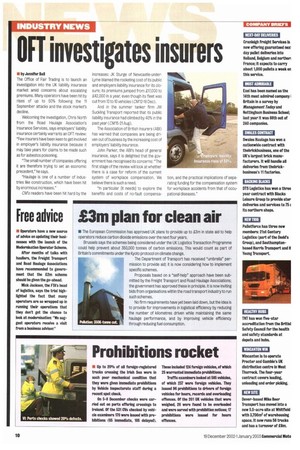OFT investigates insurers
Page 10

If you've noticed an error in this article please click here to report it so we can fix it.
• by Jennifer Ball The Office of Fair Trading is to launch an investigation into the UK liability insurance market amid concerns about escalating premiums. Many operators have been hit by rises of up to 50% following the 11 September attacks and the stock market's decline.
Welcoming the investigation. Chris North from the Road Haulage Association's Insurance Services, says employers' liability insurance certainly warrants an OFT review: "Few insurers have been keen to get involved in employer's liability insurance because it may take years for claims to be made such as for asbestos poisoning.
"The small number of companies offering it are therefore trying to set an economic precedent," he says.
"Haulage is one of a number of industries like construction, which have been hit by enormous increases."
CM's readers have been hit hard by the
increases: JK Sturge of Newcastle-underLyme blamed the rocketing cost of its public and employers liability insurance for its closure; its premiums jumped from £17,000 to £42,000 in a year, even though its fleet was cut from 12 to 10 vehicles (CM12-18 Dec).
And in the summer tanker firm JW Suckling Transport reported that its public liability insurance had climbed by 40% in the past year ( CM15-21 Aug).
The Association of British Insurers (ABI) has warned that companies are being driven out of business by the increasing cost of employers' liability insurance.
John Parker, the ABI's head of general insurance, says it is delighted that the government has recognised its concerns: "The first stage of the review will look at whether there is a case for reform of the current system of workplace compensation. We believe there is such a need.
"In particular fit needs] to explore the benefits and costs of no-fault compensa tion, and the practical implications of separating funding for the compensation system for workplace accidents from that of occupabonal diseases."
































































































































































